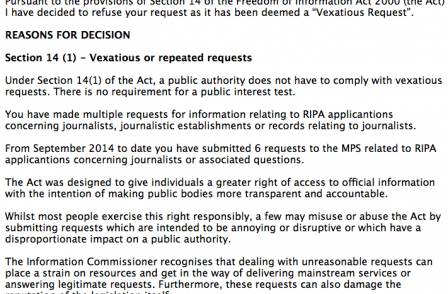
The Metropolitan Police has barred Press Gazette from requesting information about its use of the Regulation of Investigatory Powers Act to spy on journalists.
Last night, the force rejected a Freedom of Information Act request on the grounds that it was the sixth question submitted since September.
Explaining its decision to reject further FoI requests from Press Gazette, the Met said in an email that it has the right to refuse “vexatious requests… which are intended to be annoying or disruptive or which have a disproportionate impact on a public authority”.
The force said: “[A] public authority does not have to comply with vexatious requests. There is no requirement for a public interest test.
“You have made multiple requests for information relating to RIPA applicantions [sic] concerning journalists, journalistic establishments or records relating to journalists.
“From September 2014 to date you have submitted 6 requests to the MPS related to RIPA applicantions [sic] concerning journalists or associated questions.”
In this period, Press Gazette has submitted more than six FoI requests to the Met. But the six it refers to are believed to relate to the following (paraphrased) questions:
1. How many times has the Met obtained journalistic phone records under RIPA over a ten-year period? This was rejected on cost grounds.
2. A narrowed version of FoI 1, asking about specific journalists and news organisations. This was rejected on cost grounds.
3. A request for internal emails discussing FoI 1. The Met provided three, largely redacted, pages of emails (right).
4. A narrowed version of request 1, this time asking for the information over a three-year period. The Met has provided this information to the Interception of Communications Commissioner. Despite this, the request was rejected on cost grounds.
5. This asked if the Met accessed the phone records of The Daily Telegraph, as well as The Sun, under Operation Alice. The Met responded by saying that use of RIPA in Operation Alice was outlined in the closing report, which had already been published (i.e. confined to political editor Tom Newton Dunn and The Sun newdesk). Press Gazette now believes this is not true and that two further Sun journalists were targeted.
6. The final request asked the Met to say whether it had used RIPA to obtain phone records relating to a number of national newspaper switchboards. It was asked to say whether call data had been obtained from these numbers over a three-year period without specifying when and in what circumstances. This final request was rejected for being “vexatious”.
The rejection of request 6 added: “The Act was designed to give individuals a greater right of access to official information with the intention of making public bodies more transparent and accountable.
“Whilst most people exercise this right responsibly, a few may misuse or abuse the Act by submitting requests which are intended to be annoying or disruptive or which have a disproportionate impact on a public authority.
“The Information Commissioner recognises that dealing with unreasonable requests can place a strain on resources and get in the way of delivering mainstream services or answering legitimate requests. Furthermore, these requests can also damage the reputation of the legislation itself.”
Each of the Met’s six FoI responses to Press Gazette can be read in full at the links below:
Met Police RIPA FoI 2: Narrowed request on use against journalists rejected
Met Police RIPA FoI 3: Redacted emails discussed Press Gazette request provided
Met Police RIPA FoI 4: Narrowed request for information on use against journalists rejected
Met Police RIPA FoI 5: Apparent denial of further Operation Alice spying on journalists
Met Police RIPA FoI 6: ‘Vexatious’ rejection
The National Union of Journalists has condemned the Met’s latest rejection as an “outrage” and encouraged Press Gazette to complain to the Information Commissioner’s Office.
General secretary Michelle Stanistreet said: “When it comes to dogged investigations intent on getting to the truth, clearly the Met don’t like it up ‘em.
“It says a lot about our capital’s police force that they are refusing to provide basic information about the extent to their snooping and targeting of journalists, preferring to hide in bureaucratic excuses rather than cough up and reveal the extent of how they have compromised sources and press freedom.
“Their response is outrageous and demonstrates just why this law needs to be scrapped.”
Email pged@pressgazette.co.uk to point out mistakes, provide story tips or send in a letter for publication on our "Letters Page" blog
